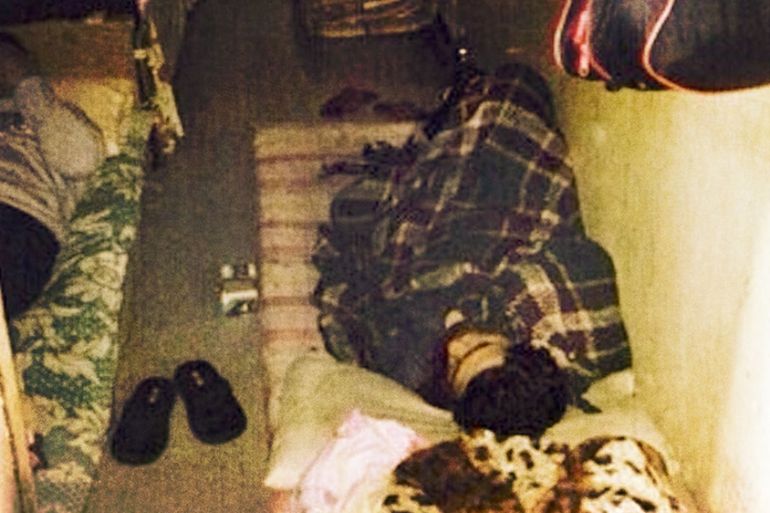Claims Denmark outsourced its torture to Lebanon
Three Danish Muslims detail gruesome life behind bars in Lebanon’s prisons, including Roumieh.

An Al Jazeera investigation has uncovered how three Danish Muslims ended up in some of the Middle East’s most notorious prisons following the alleged cooperation between Danish and Lebanese intelligence services.
Two of the men of Arab origin have revealed in an exclusive interview that when they refused offers to work for the Danish Security and Intelligence Service (PET), they were arrested and tortured in Lebanon.
Keep reading
list of 4 itemsPalestinian Prisoner’s Day: How many are still in Israeli detention?
‘Mama we’re dying’: Only able to hear her kids in Gaza in their final days
Europe pledges to boost aid to Sudan on unwelcome war anniversary
In an exclusive interview with Al Jazeera, current Roumieh inmate, Fayez Abadan, has called for help from inside the prison, saying cruel treatment is a daily practice there.
Meanwhile, a former inmate has described to Al Jazeera the gruesome torture methods used in Roumieh prison.
They allege Lebanon was acting on Danish orders in a new form of rendition – the practice of sending foreign suspects covertly to be interrogated in a country with less rigorous regulations for humane treatment – or an outsourcing of torture.
Both Denmark and Lebanon have denied the men’s allegations .
PET, which declined to be interviewed, provided a statement to Al Jazeera which said: “The Danish Security and Intelligence Service (PET) cooperates with a large number of authorities worldwide in order to protect Danish interests in Denmark and abroad.”
“However, PET can, may or will under no circumstances aid and abet torture. PET have no further comments,” the statement said.
Lebanon, which is known to have cooperated with Western intelligence services, also denied involvement.
In an interview with Al Jazeera, the then Lebanese Minister of Interior Ziad Baroud said he never received any requests to interrogate European nationals.
However, Al Jazeera understands that the men are among dozens of Danish citizens of Arab or Muslim origin who were approached by PET between 2001 and 2010.
Ali Ibrahim, a Lebanese-born torture victim, said in 2006 while he lived in Denmark, PET offered him incentives to cooperate but he was threatened when he refused. One of his brothers was involved with a group in Lebanon called Fatah Al Islam, which had taken control of the Palestinian refugee camp Nahr Al Bared, making him an attractive potential informer.
“The officer told me, ‘We will pay you money and you will be happy with us’,” Ibrahim said.
“I asked: ‘What happens if I say no to your offer?’ He said: ‘If you reject our offer, we will make you come to the station and sign every week’.”
“I told him: ‘I will then leave the country.’ He then asked: ‘Where do think you will go? We have friends all over the world. Do you want to go to Lebanon? We have friends there too’.”
Ibrahim says when he travelled to Lebanon later that year he was kidnapped from the streets of Tripoli in front of his wife and children by four armed men.
He claims he was subjected to eight months of solitary confinement, regular beatings, violent interrogrations and torture, and spent almost three years in Lebanon’s notorious Roumieh prison.
When he was first placed in a cell with others, he says: “Only then did I realise that the brutal torture I received was not the worst. Some experience much harsher torture methods. I consider myself lucky. Others were raped.”
‘No exceptions’ to prohibition of torture
Juan E Méndez, the UN Special Rapporteur on Torture, told Al Jazeera that he could not comment on specific cases relating to Lebanon and Denmark but said the rule of law was the only way to fight terror.
“There are no exceptions to the prohibition of torture and other cruel and inhuman and degrading treatment,” Méndez says.
However, says that a lot remains hidden about the extraordinary renditions that took place as a result of the so-called “War on Terror”.
Evidence of rendition first emerged after the US government in 1995 approved a secret programme for the transfer of alleged terror suspects.
“Unfortunately we are very far from knowing what exactly happened in each of the countries that participated in extraordinary renditions but we do know that there are 54 different countries that corroborated in some way or the other,” Méndez says.
He says only a handful of nations responded to UN requests for investigations. Himself a victim of torture, he says that the world is more accepting of torture today than when he was tortured decades ago.
In telling the story of three men caught in the dark web of Danish and Lebanese intelligence services, Outsourcing Torture exposes a Denmark at odds with its image as a world leader in the fight for human rights, a Denmark with secret military and intelligence ties with the US, and a quiet role in the so-called “War on Terror”.